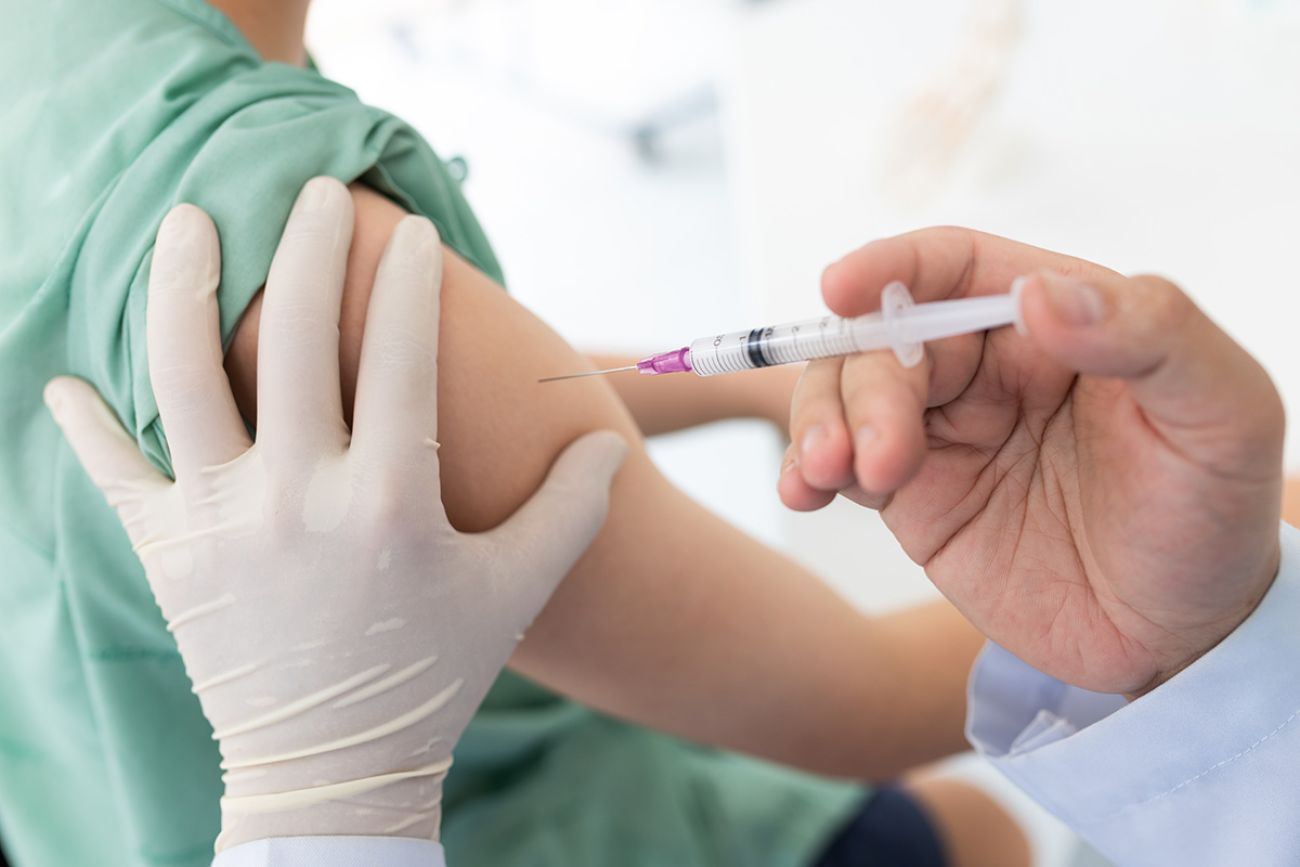Michigan back-to-school COVID, flu vaccine requirements, and RSV too

- Vaccine rates for the youngest Michiganders — those under three years old — remain down
- When considering back-to-school vaccines, families must weigh the best time for the COVID booster, if they choose it at all
- Experts say healthy adults can wait until fall for the new COVID booster, but youngsters should get a current booster now
With all the talk of COVID boosters, flu season, and even new protection against respiratory syncytial, or RSV, it’s easy for Michigan parents to get overwhelmed — especially while shopping for clothes and supplies, figuring out bus schedules and other back-to-school routines.
Dr. Delicia Pruitt, a Saginaw family doctor and medical director for the Saginaw County Health Department sees it among her patients — a general fatigue when it comes to all vaccines.
“I really do believe it's almost like a little bit of post-traumatic stress where you just go, ‘I just don't want to think about that right now. I just want to live my life,’” she said.
Related:
- One little girl’s death and Michigan’s falling childhood vaccination rates
- More Michigan parents opt to skip school vaccines for their children
“There’s a lot of information out there,” agreed Dr. Dennis Cunningham, medical director of infection control and prevention at Henry Ford Health. “It can be overwhelming.”
And that’s bad timing as Michigan students head back to school.
According to the state’s latest immunization “report card,” rates for traditional vaccines for the youngest children up through age 35 months had fallen to 65.9 percent as of June 30 — down from 74 percent at the end of 2019 — far below the national goal of 80 percent and a troubling sign for children who will soon head to preschool. That downward trend has been apparent since 2020, as the pandemic first tore through Michigan, prompting families to skip routine doctors’ visits to avoid contracting the virus.
Vaccine rates among teenagers, however, had less drop off. As of June, about 72.9 percent of Michiganders 13 to 17 had their vaccinations, compared to 73.7 percent at the end of 2019. (That number tumbles to 42.6 percent, however, for the vaccine that protects against the cancer-causing human papillomavirus.)
The state’s report card does not include vaccine rates for children ages 3 to 12.
Since 1978, Michigan has required a set of vaccines for kindergarteners that protects against diseases such as mumps, measles and rubella (the MMR shot), and vaccines for diphtheria, tetanus, and rubella (the DTaP shot). Additional vaccines, including one to protect against meningococcal disease, are also required by the time children reach seventh grade.
In Michigan, any change to the K-12 school vaccine requirements must go through the legislature's Joint Committee on Administrative Rules, which would request feedback from health professionals and parents, among others, before making a decision. Any final change to the back-to-school schedule would require a vote by the Legislature.
Other vaccines are merely recommended. Doctors told Bridge Michigan they still recommend COVID and flu boosters, though those viruses aren’t usually life-threatening for healthy kids.
“Kids tend to bring flu home,” said Henry Ford’s Cunningham. “They get it at school. They bring it to parents and grandparents.”

Even if the child isn’t normally “super sick” from COVID or flu, he said, “we all know as parents, especially if you're working, it’s so hard dealing with sick kids, especially if you don’t have daycare options or babysitters that are available.”
Arielle Leipham Ellis, a mother of a 6-year-old son and a 3-year-old daughter, said her whole family got COVID-19 a few months ago.
Her son has a doctor appointment scheduled for October but Leipham Ellis said she would like for him to get his COVID booster and flu shot before then if possible.
“The sooner the better, in my opinion,” she said. “They get a cold the first week of school and it’s just downhill from there.”
In this year’s back-to-school considerations, parents have the added calculus of deciding whether to get a COVID booster for their child, since it’s not required. And if so, whether to ask for a booster now or wait for newly reformulated versions in October.
Pfizer and Moderna are currently offering a second-generation COVID vaccine, a bivalent version that protects against both the original COVID variant and the first-generation omicron variants.
But newly formulated versions are expected in October — by Moderna, Pfizer, and Maryland-based Novavax. These versions are designed to match the currently circulating XBB variants, descendents of the original Omicron variant.
Four Michigan doctors told Bridge they’re advising healthy adult patients to wait if they can and get the updated fall version.
But it’s a different recommendation for children up through 5 years old, said Dr. Arsala Bakhtyar, chief of Pediatrics at Corewell Health's Beaumont Hospital, Dearborn and Dr. Teena Chopra, medical professor at Wayne State University. (Full CDC recommendations are here.) They should get the current booster now, if they’re due.
Booster doses are smaller for children, and that means they may not keep their immunity against COVID for as long as adults, said Bakhtyar. She recommends children continue to get a bivalent booster until the third version is available this fall.

“You're not giving them a full dose so they need two or three doses,” she said.
Chopra noted small national rises in COVID hospitalizations and the need for people to remain mindful of the virus’ potential peril.
“We are talking about and hearing that hospitalizations are beginning to go up in the U.S., and that means we have newer variants that are definitely much more clever. We need these boosters quickly,” she said.
According to state data released Monday, 205 people with confirmed COVID are being treated in Michigan hospitals, compared to a low of 110 July 19. That’s still remarkably low compared to stretches during the pandemic when hospitalizations topped 4,000 patients.
When it comes to college-age students, Michigan’s two largest universities have lifted COVID vaccine requirements. Last month, the University of Michigan said it was no longer requiring students who live on the Ann Arbor campus to receive the COVID-19 vaccine. Students are still required to submit information on whether or not they have been vaccinated.
Michigan State University announced in February it was no longer requiring students, faculty and staff receive a COVID-19 vaccine.
RSV isn’t part of the school immunization consideration, but it’s important for infant siblings heading to daycare and older adults who might be offering after-school care.
The FDA approved two long-awaited therapies this summer, and only one is really a vaccine.
In July, the U.S. Food and Drug Administration approved Beyfortus by AstraZeneca for infants facing their first RSV season and children up to 24 months of age whose immune systems are compromised. Beyfortus is not a vaccine but rather a monoclonal antibody — laboratory-created proteins that mimic the body’s immune system.
For adults 60 and older, the FDA in May approved Arexvy, the first respiratory syncytial virus (RSV) vaccine.
See what new members are saying about why they donated to Bridge Michigan:
- “In order for this information to be accurate and unbiased it must be underwritten by its readers, not by special interests.” - Larry S.
- “Not many other media sources report on the topics Bridge does.” - Susan B.
- “Your journalism is outstanding and rare these days.” - Mark S.
If you want to ensure the future of nonpartisan, nonprofit Michigan journalism, please become a member today. You, too, will be asked why you donated and maybe we'll feature your quote next time!








